MIT lawyers did not patent turn-by-turn in-car navigation in 1989 because “This will never happen.. because the insurance companies won’t allow it”. 00
Saddam Hussein’s campaign…
Saddam Hussein’s campaign song in the 2002 presidential election was “I Will Always Love You.” Hussein won 100% percent of the vote, besting Stalin’s mark of 99.95. 00
The Japanese never ate salmon…
The Japanese never ate salmon sushi until the 1980s when a Norwegian businessman, hired by Norway’s government to offload excess salmon, made a deal with a Japanese company to sell the fish in its grocery stores, leading to its popularity today. 00
Scientists once gave drugs…
Scientists once gave drugs to bees, and found that they respond similarly to humans: bees on cocaine tend to overestimate the amount of sugar they find and exaggerate when reporting back to the hive. 10
Millennials aged 18-34 are more…
Millennials aged 18-34 are more likely to live with their parents than with a spouse/partner – the first time this has ever happened since record-keeping began in the 1880s. 00
15+ Tumblr Posts That Introverts Will Love
Introverts unite!
Okay, you don’t have to actually come out and get together, but please promise me that you’ll at least enjoy these Tumblr posts.
1.

Photo Credit: Tumblr
2.
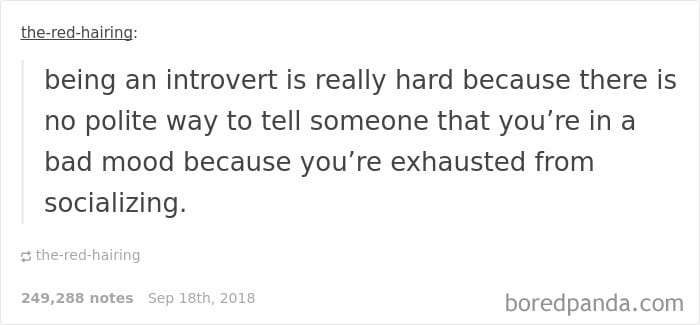
Photo Credit: Tumblr
3.

Photo Credit: Tumblr
4.

Photo Credit: Tumblr
5.
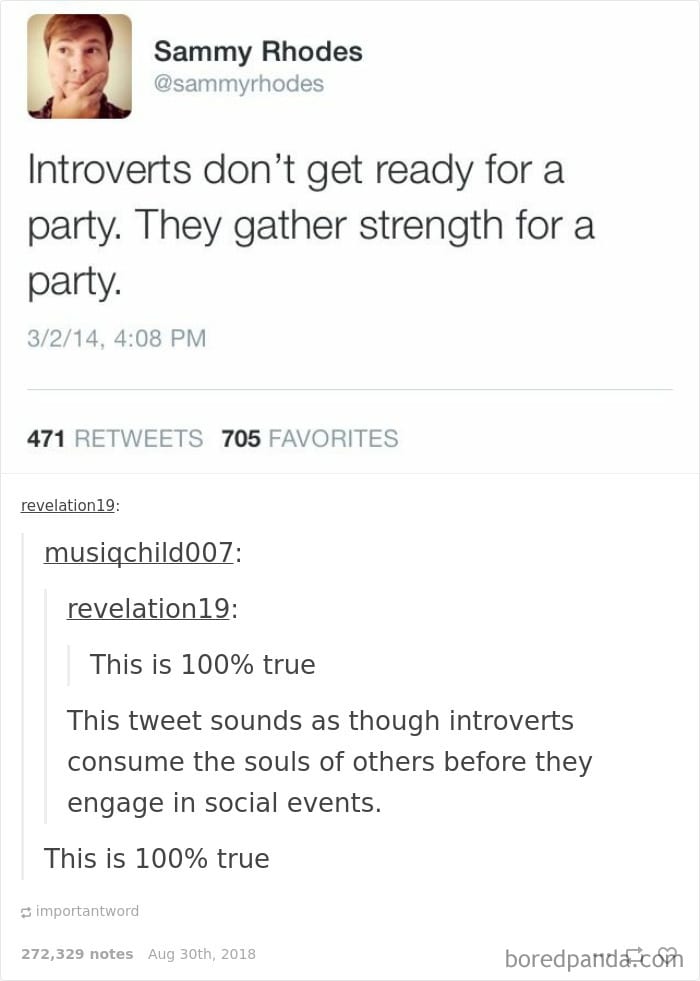
Photo Credit: Tumblr
6.
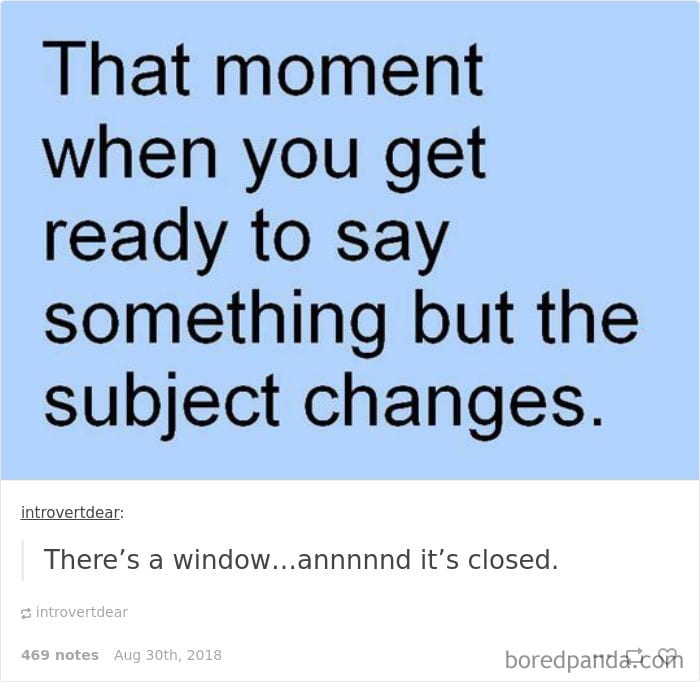
Photo Credit: Tumblr
7.
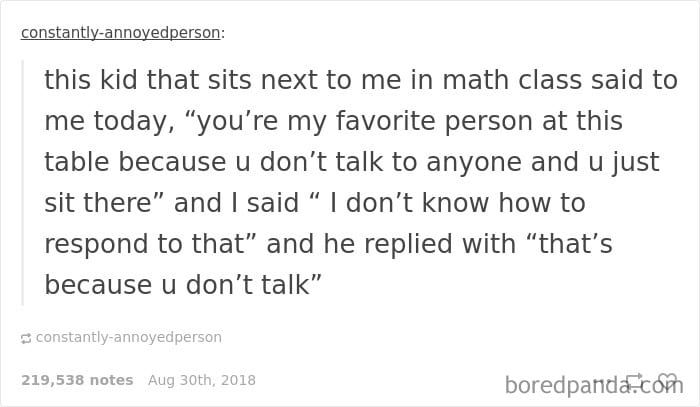
Photo Credit: Tumblr
8.
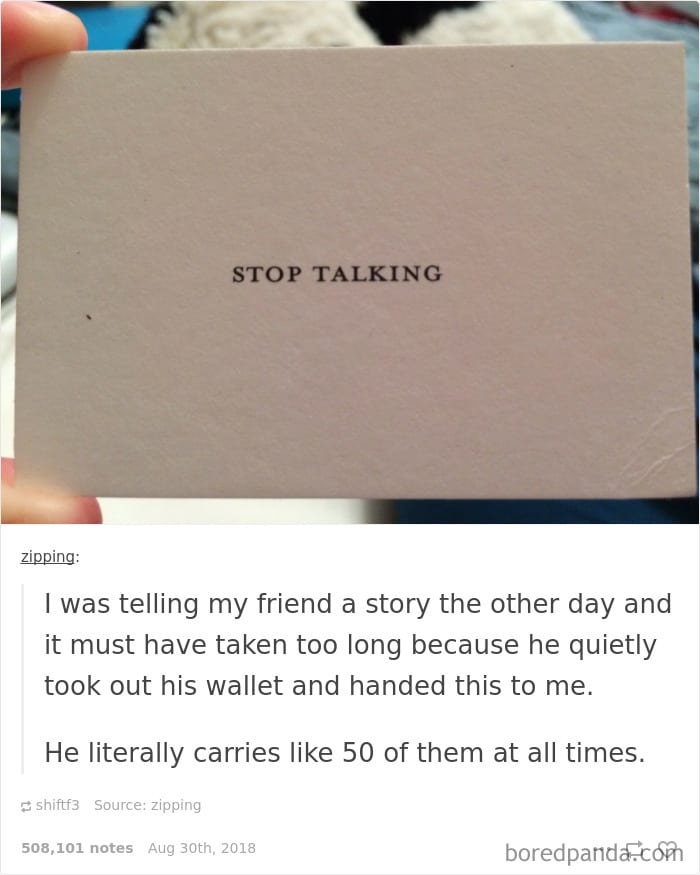
Photo Credit: Tumblr
9.

Photo Credit: Tumblr
10.

Photo Credit: Tumblr
11.
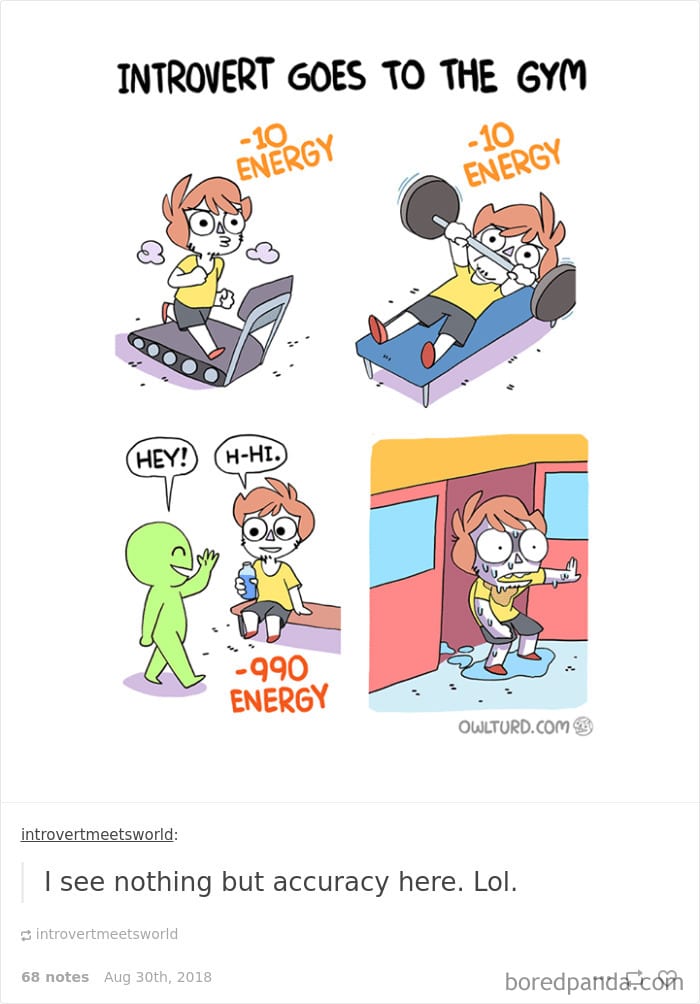
Photo Credit: Tumblr
12.
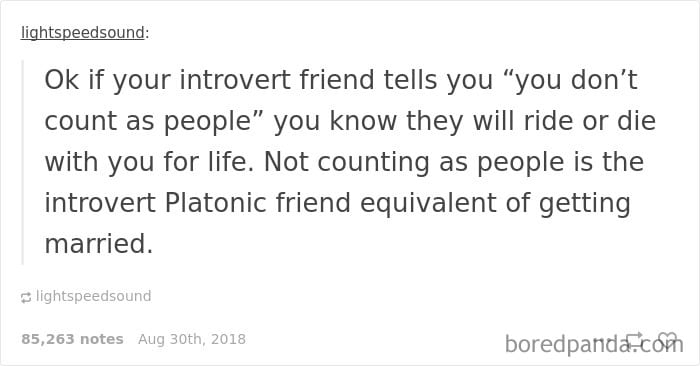
Photo Credit: Tumblr
13.
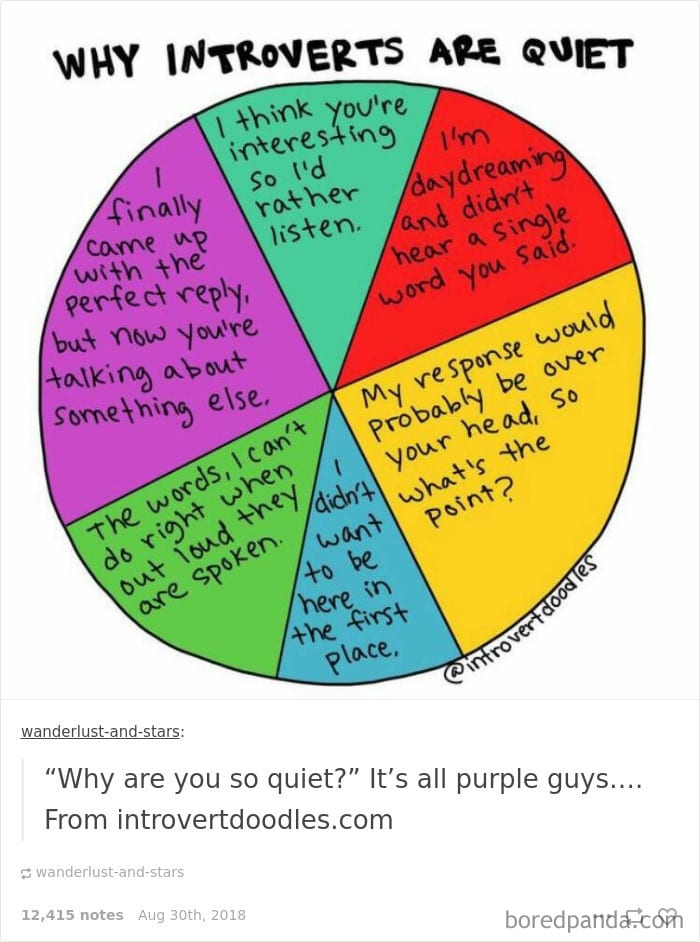
Photo Credit: Tumblr
14.
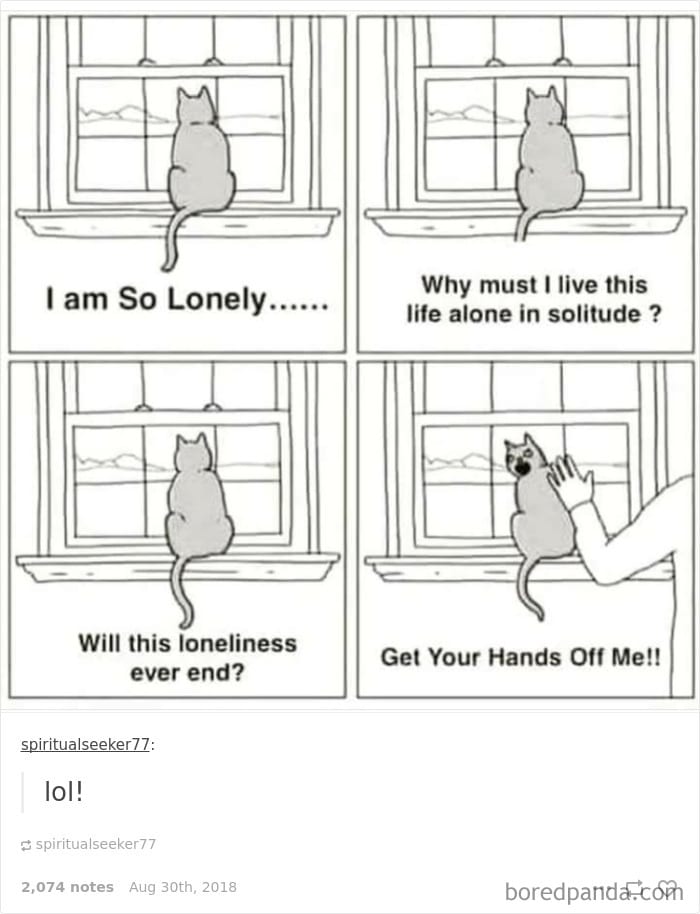
Photo Credit: Tumblr
15.

Photo Credit: Tumblr
16.

Photo Credit: Tumblr
17.
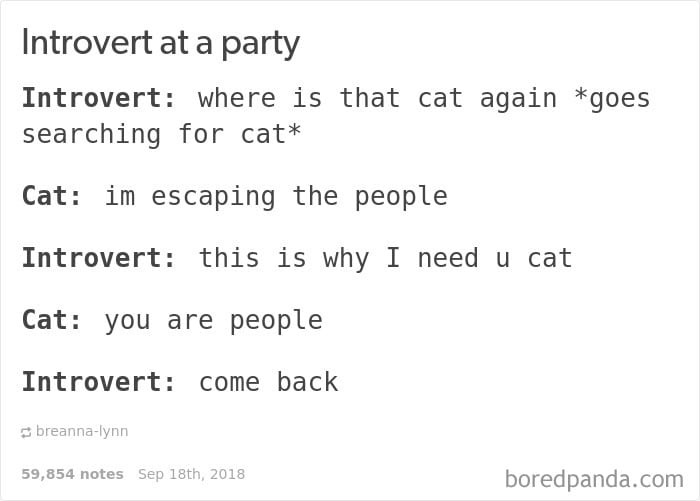
Photo Credit: Tumblr
18.

Photo Credit: Tumblr
19.
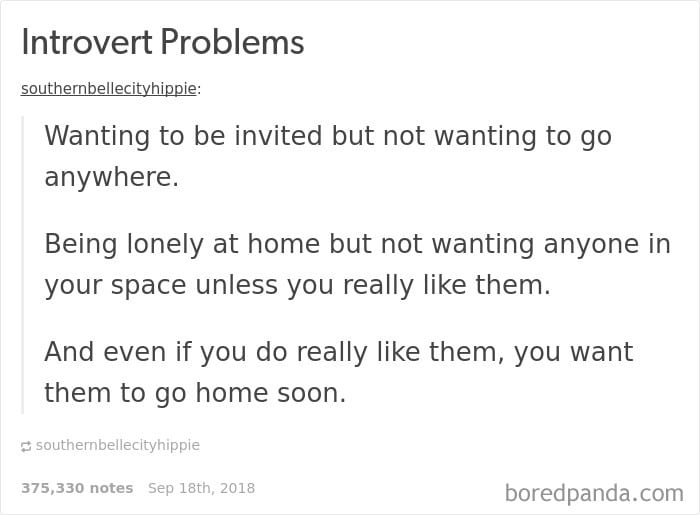
Photo Credit: Tumblr
20.

Photo Credit: Tumblr
The post 15+ Tumblr Posts That Introverts Will Love appeared first on UberFacts.
12+ People Share a Dying Tradition They Wish Would Be Preserved
There are many historical traditions that people have been all too happy to see fall by the wayside. But surely there are other, less terrible ones that are dying out that people would love to see revived, right?
According to Reddit, absolutely.
#15. RSVP
“RSVPing, saying you’ll be somewhere and actually showing up, consistency, etc.”
#14. Home ec
““Home economics” as they used to call it. Learning the basics of cooking, baking, sewing, cleaning and how to manage a household budget. They are useful and important things to know no matter who you are.”
#13. No way to live
“Fixed work weeks.
I’m off on Wednesday’s and Thursdays. I can plan things for those days.
Every job I had before this would give me two days off every week, but I’d never know when they were going to be until the Sunday before. It’s no way to live and it doesn’t make for happy employees.
Edit to leave this for the people who don’t understand how this happens.”
#12. Letters
“Handwritten letters.
I’m not sad to see the greeting industry die (fuck $6 for a fucking card, and I say this as a former Hallmark employee), but I wish it was more common to send handwritten letters. They’re treasured in a way you can never treasure an email. Having something handwritten is also such a meaningful connection (and keepsake if needed).”
#11. Sobremesa
“Sobremesa.
That time at the end of a big dinner with friends and loved ones where you just sit around the table drinking wine and shooting the shit. Forget doing the dishes. Forget running off to go and do whatever. Just make some time to sit and spend time with people and enjoy some good dessert and a nice glass of whatever without getting drunk for the sake of it.”
#10. Castles
“Castles, no one builds a good castle anymore. I mean sure there are “castle like” buildings but not a good 11 foot thick wall of stone castle.”
#9. Postcards
“Whenever I travel, I love to send postcards to my young family members. Sometimes I go to an antique store and find vintage postcards from the area I’m visiting.
I’ve gotten positive feedback, they all seem to think it’s neat to get them, but recently I received one from a young family member and it was a nice surprise!”
#8. Drive-ins
“Drive In Movie Theaters.”
#7. Hand-drawn animation
“Traditional animation. A lot of the big animation studios claim it’s too expensive and time consuming but if you look at their budgets and how long it can take to render CG animated films then it’s about the same difference.
Edit: I mean hand-drawn vs any computer animation, not necessarily 2D vs 3D”
#6. Quality time
“Competitive Board games with family, it’s a nice time to spend with them.”
#5. Harvest festivals
“Harvest festivals. It really only works in small to medium agricultural towns, but it really grounds one to the seasons and agricultural production. Right now in Lodi California we are having the annual Lodi Grape Festival, themed after the winegrape harvest season, and it’s been going for something like 60 years.”
#4. Canning and preserving
“Canning and preserving food. I grew up doing this and it’s something I still do. There’s nothing like eating chili in the winter with tomato juice you made yourself or eating homemade strawberry jelly. My friends didn’t grow up in that lifestyle but enjoy when I bring them fresh jelly in the spring.”
#3. Porch sitting
“Sitting on your porch.”
#2. Holidays
“Stores being closed on holidays. It’s dead already, but was so much better.”
#1. Halloween.
“Trick or treating. It seems like a lot of families today are opting for the convenience of “trunk-or-treating,” where everybody gets their cars and park in a cul-de-sac and hand out candy from their trunks. I’ve heard people call it “safer” but honestly, walking around and seeing everyone’s house decorations and costumes was the fun part, not just getting the candy. I think it’s kind of sad that a lot of kids are missing out on the experience =(“
The post 12+ People Share a Dying Tradition They Wish Would Be Preserved appeared first on UberFacts.
15 Veteran Teachers Explain the Biggest Differences Between Kids Then and Now
Kids are definitely not the same as they used to be. Every generation thinks they were better in some way than the ones to come before or after – smarter, more respectful, better behaved – but what do the people who spend ALL day with kids think? How about the teachers who have stood in front of classrooms for more than a couple of decades?
The 15 experienced educators below are sharing their opinions on just that!
#15. Self-regulation.
“20 years experience. I find the biggest difference is the inability to self regulate. Some kids struggle with the word “wait.” Some kids struggle when their emotions get too big- they don’t have coping mechanisms. Some kids aren’t able to interpret the emotions of others. However many kids are just fine.
I think it is related to changes in parenting and technology. The instant gratification of technology combined with parents who don’t create boundaries create kids who can’t self regulate.
However I also think that kids spend less time outside unsupervised. The natural processes of learning and social interactions is not happening for most kids.
Most kids are really pretty good. Every year I have kids that prove my faith in humanity. But that 10% who trash classroom, scream, and freak out are getting worse. The difference between the top and the bottom is only getting larger.”
#14. Monster parents.
“モンスターペアレント (monster parents)
at least that is what my Japanese uncle, who is a teacher, told me. Basically parents, who do not see the fault in their children but the teacher if the grades of the child are bad or something in the likes.
I wanted to hear some stories from him, but my uncle’s been very discreet about it, he just mentioned that there have been an increasing number over the years (although by far not the majority) and that is all I need to know.
Edit: Changed “discrete” to “discreet”.”
#13. A lot less optimistic
“20 years ago when I was in high school, my freshmen English teacher who had been teaching for 30 years said, “The only difference I notice between kids today and kids from when I started teaching is that the kids today are a lot less optimistic about the world they are inheriting.”
I’ve been a teacher for 15 years, and the difference I notice is in what the kids like. You don’t realize how quickly pop-culture turns over until you find out a 4 year old reference is dated for kids.
Edit: Spelling”
#12. An increase.
“An increase in helicopter parents.”
#11. Math ability.
“Math ability has declined tremendously. Several reasons for it:
1) most important is the no child left behind mentality so teachers are pressured to teach to the test and get people to memorize tricks or things to do in certain problems without understanding why. By the time they get to college they almost understand nothing, but our mentality is becoming similar. Kids are just being jammed through memorizing arbitrary steps like it was historical dates. That defeats the whole point and power of math and science
2) access to the internet, cell phones, wolfram alpha, etc means as soon as kids get stuck on a problem they look it up and get the answer. There’s no more hard work and attempt at difficult critical understanding
3) not understanding that studying is effort not time. Memorizing and reverse engineering solutions for three hours (and mind you most kids are willing to put in time) is far less useful than STRUGGLING for an hour creatively trying to reason through a few difficult problems yourself.
Despite this, the top 1-5% are still the same incredible top 1-5% (perhaps better since they are using technology to augment their understanding instead of substitute for it).”
#10. Never.
“Then
“My parents were too hard on me, I’ll never be like them to my kids”
Now
“WHY CAN’T I CONTROL MY KIDS”
#9. The internet.
“Failure is a part of learning, but each of those failures is expensive and demoralizing.
Kids have access to the internet. They know more and more about what life after highschool and college is like. They know that even if they get a degree they still don’t have a guaranteed shot at a job. And they are told that if they do poorly at all in highschool they won’t have the GPA and test scores necessary to get into a good college.
So every time they get a poor grade on a test, they see the chances of having a successful future shrinking. And it doesn’t help that parents can usually check their grades online. Nothing worse than sitting down to dinner and knowing your mom will bring up the 60% you got on that test in AP bio yesterday.
Before I go further, I should mention I am currently a junior in high school.
I wouldn’t say I have anxiety or depression but I’m honestly surprised by that. So many of my friends are having a tough time emotionally and school hasn’t even been going for a month. Every day you come home with an hour or more of homework from most of your classes, you have tests frequently, there are large projects and papers that you need to work on, and each class is flying through the textbook so fast that if you miss a night of reading you’re screwed.
Everyone is told (albeit indirectly) that if they mess up AT ALL their future is shot. They are told that even if their performance is flawless, they could still end up unemployed even with a degree. Then from the other side they are told that failure is important to learning. But failure means a lower grade, and grades are more important than learning in school today. I don’t cheat on tests, or have anxiety/depression, but I completely understand why the majority of my friends do.
My advice to you as a teacher is to make sure that those failures happen before success feels critical (I’m assuming you’re a highschool teacher). Sure they might learn by failing their midterm, but thats not where the learning is important. Failure should happen on homework and classwork assignments with very little impact on their grade. There’s nothing worse for a kid than getting to a test and not knowing what to do because they were too worried about the grade on their work to really learn from it.”
#8. Zero power.
“I’m a fairly new teacher, but this is accurate. I had a student recently who spent the whole term in my class in his phone. We had no phone policy, so when I told him to put it away he said “or what”. He was right because I had zero power to force him to put it away. So the whole term he didn’t listen to a word I said. He ended up failing my class by 1%. His parents contacted me every day for a week only after I posted grades. He had an F since day one. They argued that 1: he wouldn’t be able to play sport if I failed him so I needed to reconsider, 2: it’s my job to make him pay attention by making the class more interesting (I had contacted them 4 times throughout the term letting them know he wouldn’t get off his phone and was failing already with no response until now), 3: it’s only 1%, so it’s not a big deal to round him up to passing, and 4: that because I was a new teacher, I didn’t understand the ‘rules’ behind teaching athletes. I was so mad I was shaking. Over the phone they admitted they failed as parents multiple times, but wouldn’t do anything to remedy it. So instead they wanted me to just pass him because “what harm would it do just letting him through?”.”
#7. Touchscreens.
“My mum was a nursery (so kids 3-4 years old) teacher for 30+ years and her classroom had a computer in it. Most kids would be familiar with the screen/mouse/keyboard when they arrived even at their young age when she taught in the 2000s and it became normal for families to have a home computer. In the last few years before she retired she noticed a trend of kids coming in and not knowing ow to use the mouse or keyboard because they were so used to iPads and touch screens.”
#6. Mental health.
“I’ll add to some of the other commenters regarding mental health–forget the achievement gap, it’s the prevalence of anxiety, depression, and emotional instability across all student demographics. Last year, I worked with at least 20 students (out of 90 or so in my classes) who were dealing with some sort of anxiety. It didn’t matter if the student had two parents, one parent, middle- or low-income… students were seemingly on the verge of a nervous breakdown. I think there, anecdotally, many reasons why this is the case, but for the purposes of his thread, I’ll just say that it has altered the way I prepare students for quizzes, share results afterwards, etc. I spend more time ensuring that my student feedback (written or otherwise) is gentler, encouraging, and growth-mindset-oriented. It’s hard to be constructively critical without any rough edges at all, and everything is carefully contextualized so as not to get them to quit.
Parents are just as quick to judge, as well. How do you guard against enabling helicopter parents when you have students in the verge of tears in your classroom? This is difficult to balance because failure is a part of learning, but trying to convince kids that is getting more and more difficult each year.”
#5. The parents.
“I would think society in general has changed. We are much more aware of the crazy shit happing around the world so im gussing parents are more concerned, strict, and “mombies”. Why i never ever want kids is because i would be one of those parents the world is just so crazy. Id want to know whats up 24/7.”
#4. Technology.
“To me, technology has become the babysitter to many kids. Social media and unfiltered content is exposing kids to many things most current adults were never exposed to at their age. Parents either dont care and want the quiet an iPad or cell phone brings to their kids, or they’re working their asses off just to put food on the table, and dont have many options for babysitters.”
#3. Older kid problems.
“Younger kids have older kids problems. Kids aged 8-10 today have the problems that kids 14-16 had 2 decades ago. This permeates every facet of their lives.
Societal norms, life education, laws, education systems, typical parenting styles, etc etc etc have not kept up with the ultra-rapid evolution of the internet and the ability for anyone at all to have access and exposure to anything, anything at all, instantly, anywhere.”
#2. iPhones.
“11 years of experience. When I started teaching, having a RAZR with unlimited texting was cool. Now, most elementary-aged kids in my school have iPhones that allow them to access virtual classrooms any time they want. The ubiquity of internet-capable technology is the biggest difference I notice, even for families living in poverty.”
#1. Never goes out of style.
“My professor who taught for 30+ years before he retired said “A lot of things change, but someone is always wearing a hoodie and jeans. That never goes out of style”
The post 15 Veteran Teachers Explain the Biggest Differences Between Kids Then and Now appeared first on UberFacts.
15 “Warning Labels” People Would Give Themselves
I wish everyone came with a warning label. You know, a nice clear message pinned to their shirt reading misogynist, misanthrope, potential rapist, or emotionally unavailable – that could have saved me some time and trouble. If everyone did, though, what would yours say?
While you think about that, check out what these 13+people came up with for themselves.
#15. Extreme pressure.
“Contents under extreme pressure.”
#14. Upsetting the introvert.
“Warning: If you are close enough to read this, you are upsetting the introvert.”
#13. Possibly toxic.
“Possibly toxic.
Not suitable for children”
#12. Just sad.
“Warning: will make jokes about traumatic childhood that aren’t really that funny, just sad.”
#11. The standard.
“The standard: “CAUTION: Does NOT play well with others!”
#10. Overanalyzing everything.
“Warning: May seem laid back, but is really over analyzing everything.”
#9. A known hazard.
“WARNING: This person contains a chemical known to the State of California to cause cancer, birth defects, or other reproductive harm.”
#8. Fragile.
“Fragile: handle with care”
#7. High amounts of salt.
“May contain cripplingly low self esteem and high amounts of salt.”
#6. Don’t take it seriously.
“Warning: don’t take anything the sarcastic asshole says seriously.”
#5. Small parts.
“HAZARD – small parts”
#4. Not suitable.
“Allergy Warning:
Contains NUTS
Not suitable for nut and or sesame allergy sufferers due to the methods used in the manufacture of this human.”
#3. Do not use.
“Warning- do not use as a projectile in a catapult”
#2. And by ‘may,’ I mean ‘does.’
“may contain alcohol”
#1. May cause headaches.
“Warning: May cause headaches
I had a chemist show physical signs of pain when I refereed to Oxygen as “H0O2″.”
The post 15 “Warning Labels” People Would Give Themselves appeared first on UberFacts.
People Born After 1999 Will Never Understand These 20 Tweets
Today’s pop culture makes absolutely no sense to me and I never have a clue what anyone is talking about anymore. It’s pretty confusing! I don’t know about you, but I’m pretty glad I grew up (mostly) in the 1990s.
But the joke’s on them. Those damn kids don’t know what they missed out on. And these tweets nail it.
1.

Photo Credit: Twitter
2.

Photo Credit: Twitter
3.

Photo Credit: Twitter
4.

Photo Credit: Twitter
5.
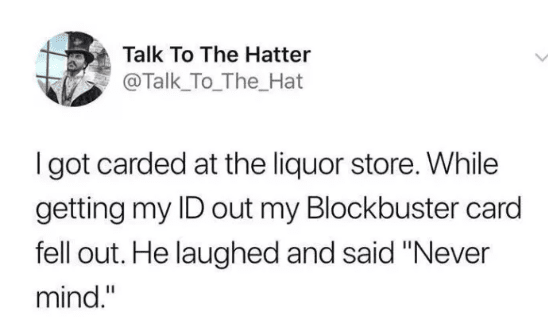
Photo Credit: Twitter
6.
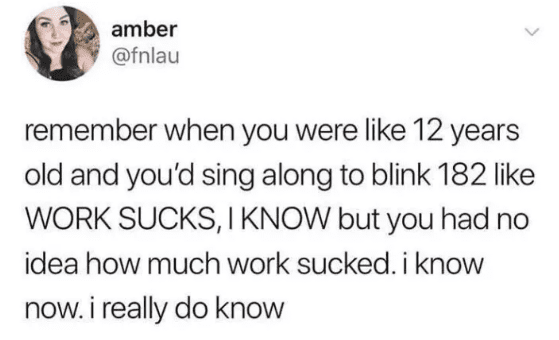
Photo Credit: Twitter
7.

Photo Credit: Twitter
8.
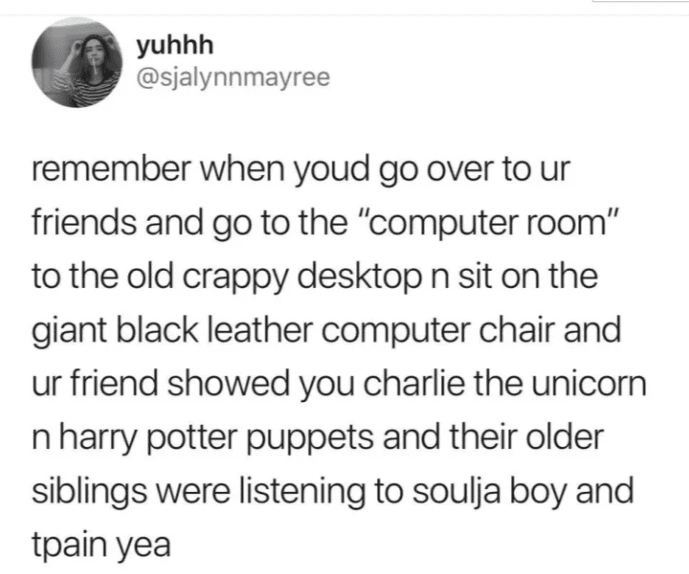
Photo Credit: Twitter
9.

Photo Credit: Twitter
10.
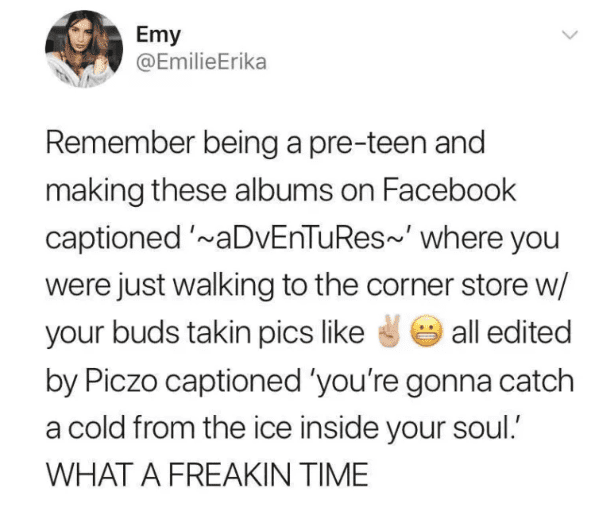
Photo Credit: Twitter
11.

Photo Credit: Twitter
12.

Photo Credit: Twitter
13.
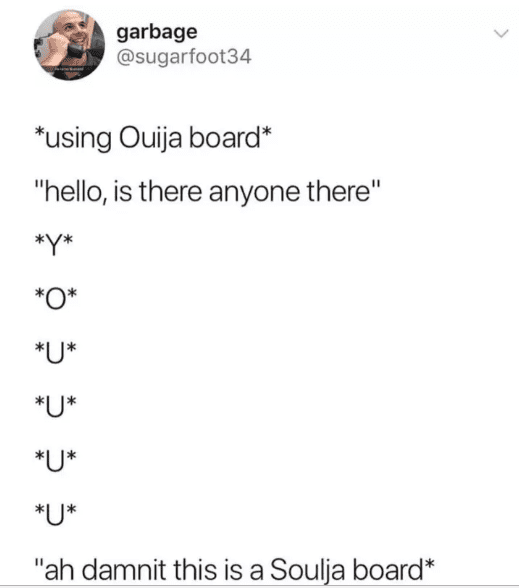
Photo Credit: Twitter
14.

Photo Credit: Twitter
15.

Photo Credit: Twitter
16.

Photo Credit: Twitter
17.
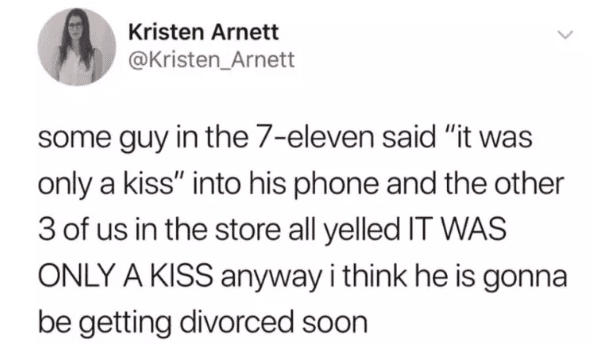
Photo Credit: Twitter
18.

Photo Credit: Twitter
19.

Photo Credit: Twitter
The post People Born After 1999 Will Never Understand These 20 Tweets appeared first on UberFacts.









